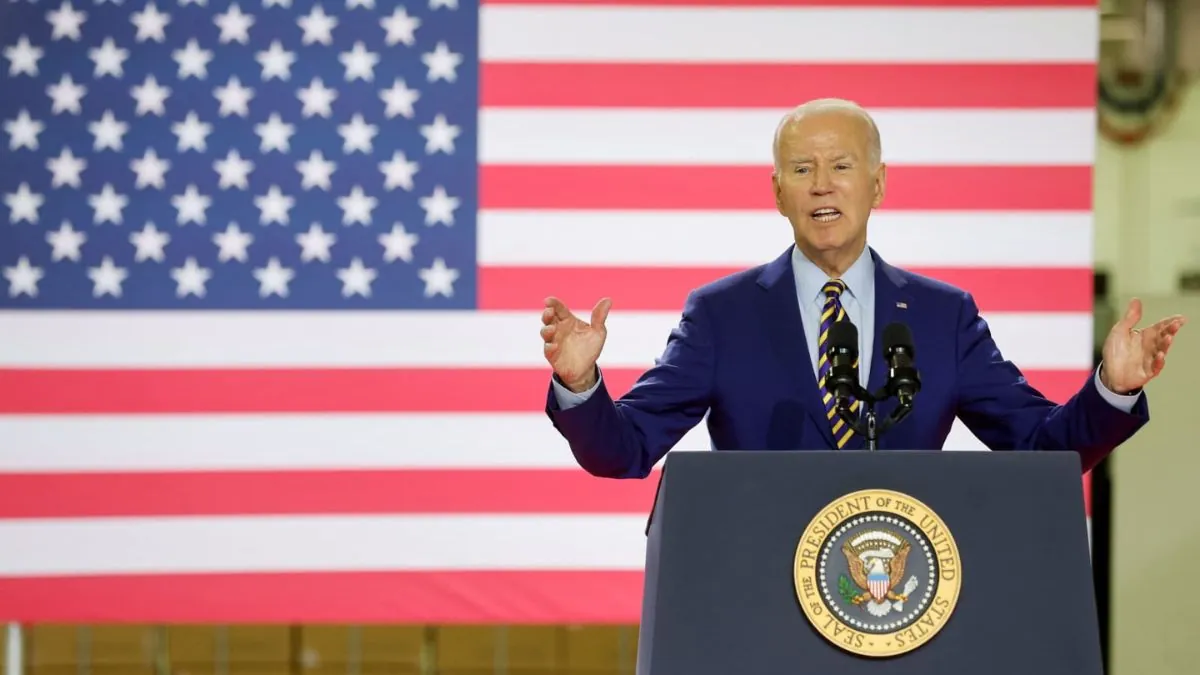President Joe Biden is working hard to persuade citizens who are fed up with inflation that the US economy is strong.
“America has the best economy in the world,” he told NBC’s “Today” on Monday, laying the foundation for his reelection campaign.
America’s economic standing around the globe is becoming an early campaign flashpoint, with former President Donald Trump portraying the country as a commercial wasteland.
“We are a nation whose economy is collapsing into a cesspool of ruin, whose supply chain is broken, whose stores are not stocked, and whose deliveries are not coming,” Trump yelled at a rally in Georgia last month.
However, the facts depict a different image, one more consistent with Biden’s narrative of American economic superiority than Trump’s ominous warnings.
Inflation has declined substantially from its 2022 highs, though it has recently risen again.
“On inflation, it is too soon to say whether the recent readings represent more than just a bump,” Federal Reserve Chairman Jerome Powell said Wednesday.
Meanwhile, the US GDP expanded by 2.5% in 2023, greatly surpassing that of other developed economies, according to an International Monetary Fund assessment released in January. The IMF predicts that the United States will maintain that lead in 2024, although the rate will fall to 2.1%.
Canada and Germany, two other significant advanced economies, fall behind with 1.1% and minus 0.3% GDP growth in 2023, respectively.
“The US economy is setting the tone for the global economy. Moody’s chief economist, Mark Zandi, told CNBC that it is propelling the global economy forward.
As experts monitor the uneven decline of US inflation, the numbers in major countries around the world remain high. In Canada, for example, the consumer price index climbed 3.9% in 2023, while in Germany, inflation was 5.9%.
Countries compute inflation differently, making direct comparisons challenging.
However, Zandi stated that even after accounting for the calculation errors, the United States still appears to be performing well in terms of inflation.
“Using the same methodology as, let’s say, the European Union, the Fed’s already at target; inflation is already below 2%,” he added.
Even as interest rates have risen, the labor market has remained robust. Private enterprises in the United States added 184,000 jobs in March, according to payroll processing provider ADP, much exceeding the Dow Jones’ upwardly revised projection of 155,000. This is the fastest rate of job growth in the United States since July 2023.
In recent months, the stock market has also had record gains, and house prices have risen, though they have now begun to fall as inventory levels increase.
Apart from the persistently high prices that are predicted to decrease in the following year, Zandi noted that the fundamentals of the current US economy are practically ideal: “The economy is in fantastic condition. It’s hard to argue with.”
‘policy And Luck’
Several factors have contributed to the United States’ current economic outperformance.
“It’s both policy and luck,” said economist Joseph Gagnon of the Peterson Institute for International Economics, a Washington-based think tank.
In reaction to the pandemic’s economic shock, the US government pumped approximately $4 trillion in stimulus into the economy to help individuals and companies.
“We had more fiscal stimulus than any other country, and that is part of the reason why the U.S. has recovered from the COVID depression better than any other country,” said economist Josh Gotbaum, a former White House and Treasury Department official in both Republican and Democratic administrations and a guest scholar at the Brookings Institution.
America’s stimulus safety net came at a high cost, resulting in a far bigger fiscal deficit than other countries. However, it also kept the economy afloat by providing a cushion that prevented corporations from implementing mass layoffs, which could have led to a recession.
That labor-market resilience has persisted. Despite the Federal Reserve’s strong interest rate hikes, the unemployment rate has remained around 4% for the previous two years, although it rose slightly in February.
Meanwhile, in February, Canada’s jobless rate was 5.8%, up 0.1 percentage point from January. The unemployment rate in the European Union was 6.0%, according to Eurostat.
The durability of the US economy in the face of geopolitical crises, as well as the distinctive structure of the American financial system, contribute to its worldwide prominence.
The United States experienced less disruption from Russia’s invasion of Ukraine than regions like Europe and Japan, which depend more heavily on Russian energy and food imports.
“That’s the luck part,” Gagnon explained.
The US economy’s resilience is also due to its unique debt structures.
The 30-year fixed-rate mortgage, which let people lock in extraordinarily low mortgage rates from the beginning of the pandemic, kept US households more protected from worldwide rate rises. That 30-year mortgage rate, which is primarily unique to the US financial system, shielded consumers when rates rose.
“Our banking system takes a lot of interest rate risk, but in the rest of the world, they shove it on to households and businesses,” Zandi added. “That was really important this time around.”
Not ‘free and clear’ yet
Even though the United States’ economy is ahead of the rest of the developed world, there is still opportunity for setbacks in the recovery.
“I don’t think we can conclude that we’ve soft-landed, that we’re free and clear,” Zandi added.
Despite previous signals that the Federal Reserve might drop interest rates three times this year, it remains hawkish for the time being.
Atlanta Federal Reserve President Raphael Bostic now predicts only one rate drop this year, perhaps in the fourth quarter.
“The road is going to be bumpy,” Bostic said Wednesday in an interview with CNBC’s “Squawk Box.”
And, while the course of the US economy’s recovery remains uncertain, economists are optimistic.
“We’re basically on or above the track we were on before the pandemic hit,” said Gagnon of the Peterson Institute. “So that’s pretty darn good.”

